What is Grief?
- Definition:
- extreme sadness,
- a heavy experience,
- a sense of loss;
- Can becausedby:
- a deadly disease;
- a loss of a person;
- a loss of a relationship.
Indeed, life has its immutable laws, and a person is given both joy and sorrow. They are often called the white and black stripes in life. Many people are trying hard not to notice the “black stripes,” thinking that this tactic will allow them to live more peacefully and happily.
However, when a black streak falls on a person, they tends to fall into a strong sense of grief.
Grief is a feeling of extreme sadness caused by hard experience and feelings of loss.
Reasons for grief vary, but in general, they include the death of loved ones, fatal illness, the severance of a relationship with a loved one, or the loss of a beloved pet.
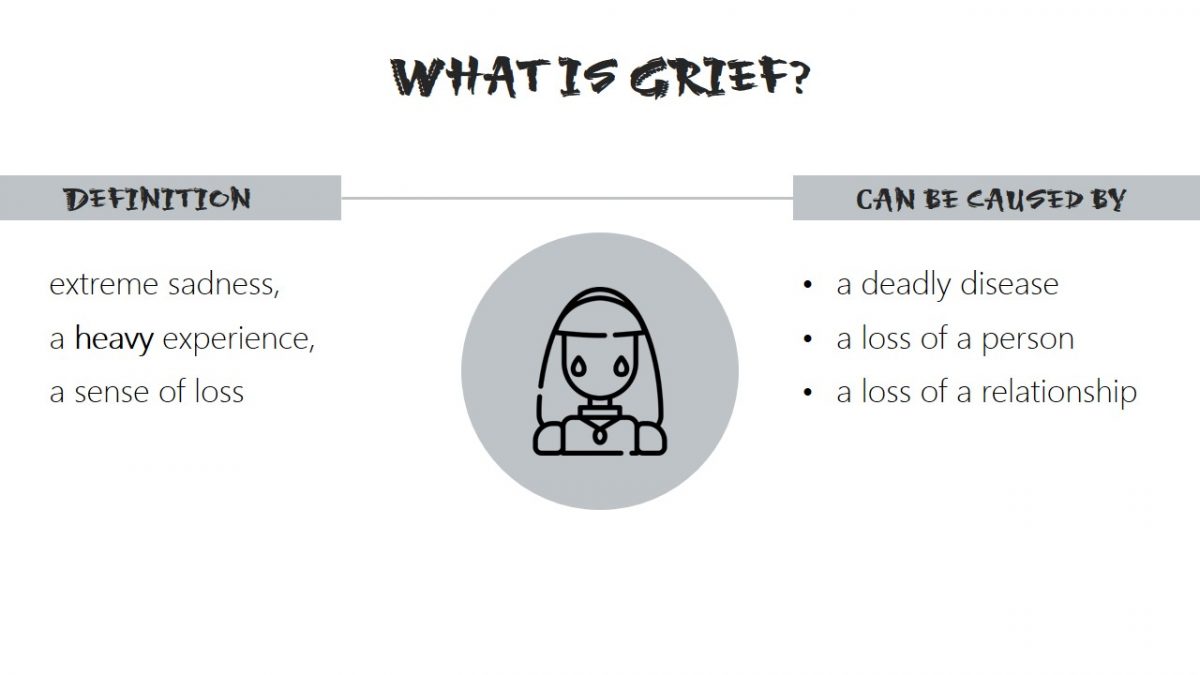
There are five stages of grief
- denial and isolation;
- anger;
- bargaining;
- depression;
- acceptance.
It is worth noting that these stages may sometimes not be performed or not proceed in such a sequence (Stroebe et al. 458).
Almost any state of grief can be broken down into the next five stages. These include denial or shock, anger, bargaining, depression, and the final stage of acceptance. A common mistake is the mandatory requirement of all these phases in this order. Everyone has their way of living with these phases: someone jumps over a stage; someone gets stuck in one. Everything depends on personal circumstances, age, personality type, state of health, and lifestyle. It is essential to understand what happens to the psyche now of losing and living grief.
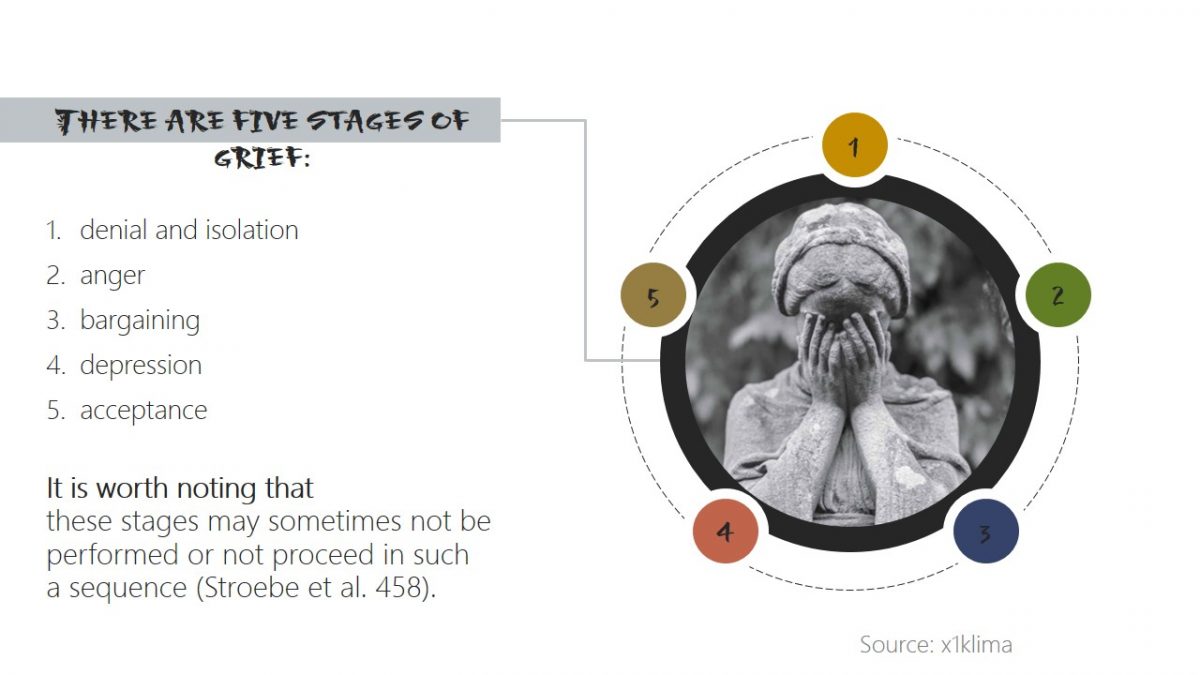
Denial and Isolation
“ It is not happening. It is not real…”
- this stage helps us through the grief;
- it suppresses reality;
- people think life is meaningless.
Knowneffects:
- change in sense of time;
- lack of appetite;
- emotional distance.
When this stage is reached, a person does not believe in what happened, especially if he or she learns about it unexpectedly. Subconscious fear does not allow a person experiencing grief to adequately assess the reality. This stage is characterized by a violent reaction in the form of shouts, worries, negation of the inevitable. Everyone must sooner or later realize that their life is short-lived and accept it in time. People try their best to find out the truth, hoping that the news is wrong.
The sufferer avoids reality and stops interaction with the world around him and himself. The decisions that one makes are inadequate, and this behavior inspires doubts about one’s mental fullness. For example, someone who has learned of a relative’s death may continue to behave as if they were still alive.
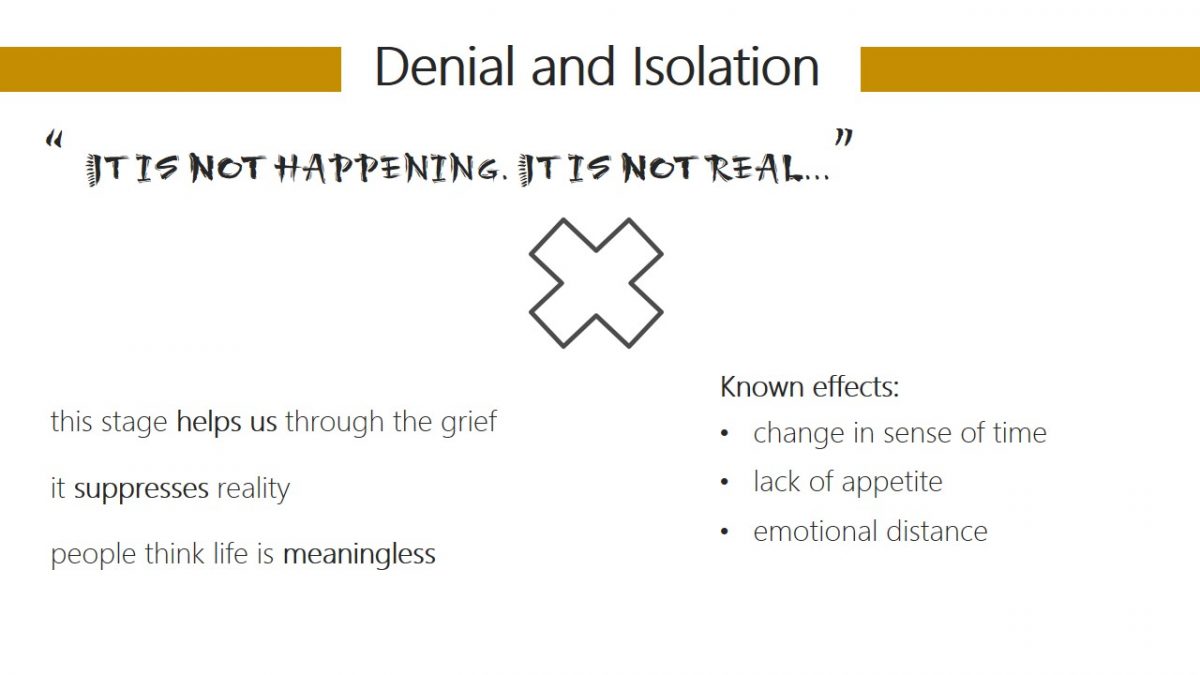
Anger
“ It is all your fault! ”
when denial goes away, a person faces reality but a person isnot ready for it anger can be directed at anything or anyone and has no limits.
There is pain underneath the anger.
The next stage of grief is aggression, anger, or resentment. The peculiarity of this stage is that negative emotions can manifest themselves quickly or gradually. Constructively, the negative is focused on the cause of the loss. Such behavior serves as a form of protection: the punishment of enemies who have caused evil. Aggression is not an effective means of experiencing grief and is directed at oneself, others, or the fate of the deceased.
Expression of anger brings temporary relief: the psyche is freed from pressure, and the person starts feeling more comfortable. There are cases of self-harassment, whether moral or physical, which can be manifested in the form of internal hatred.
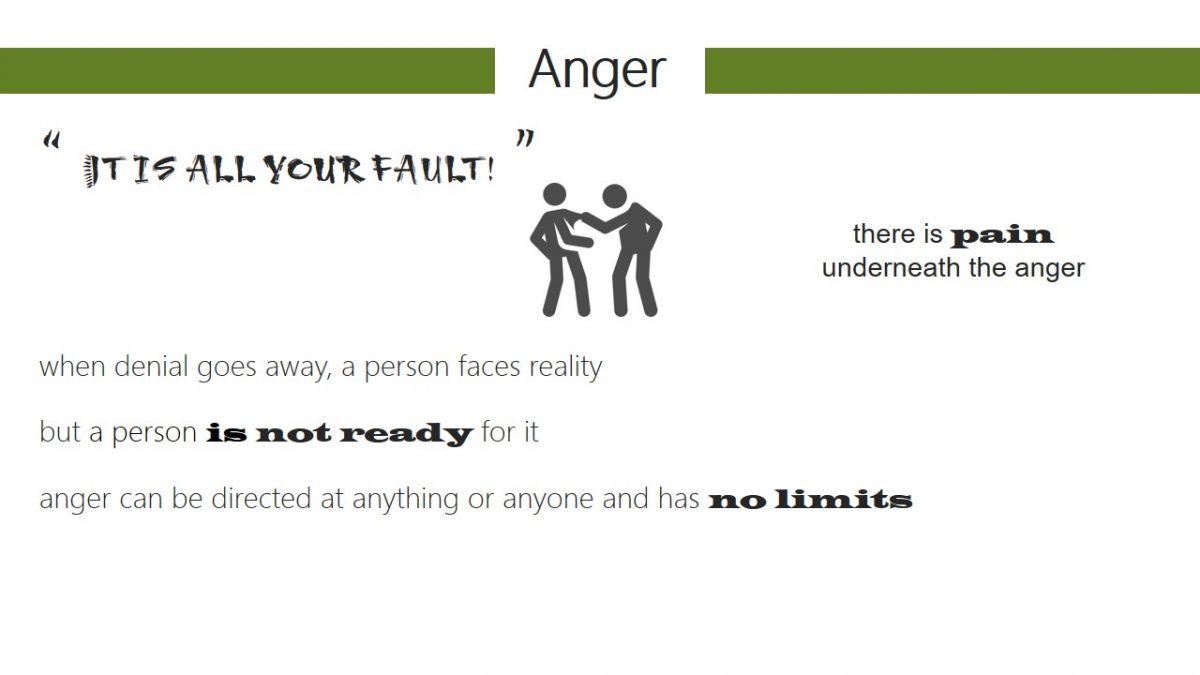
Bargaining
“ If only I could… ”
It is the weakest type of protection from reality
- this stage is based on a deep sense of guilt;
- people often turn to religion in the hope of salvation;
- the desire to go back in time to prevent everything.
Over time, anger and aggression retreat, but they are replaced by bargaining. A person tries to find ways to return to the past, looking for something that could change what happened, to fix the irreversible. At this stage, the person blames what has happened on themself. It is as if a person is struggling with fate, begging the higher powers for another outcome of events. There is a need to go into the world of imaginary salvation, to wait for a miracle, exception, a gift of fate. As a result, a person is inclined to engage in spiritual practices, seeking help in the church.
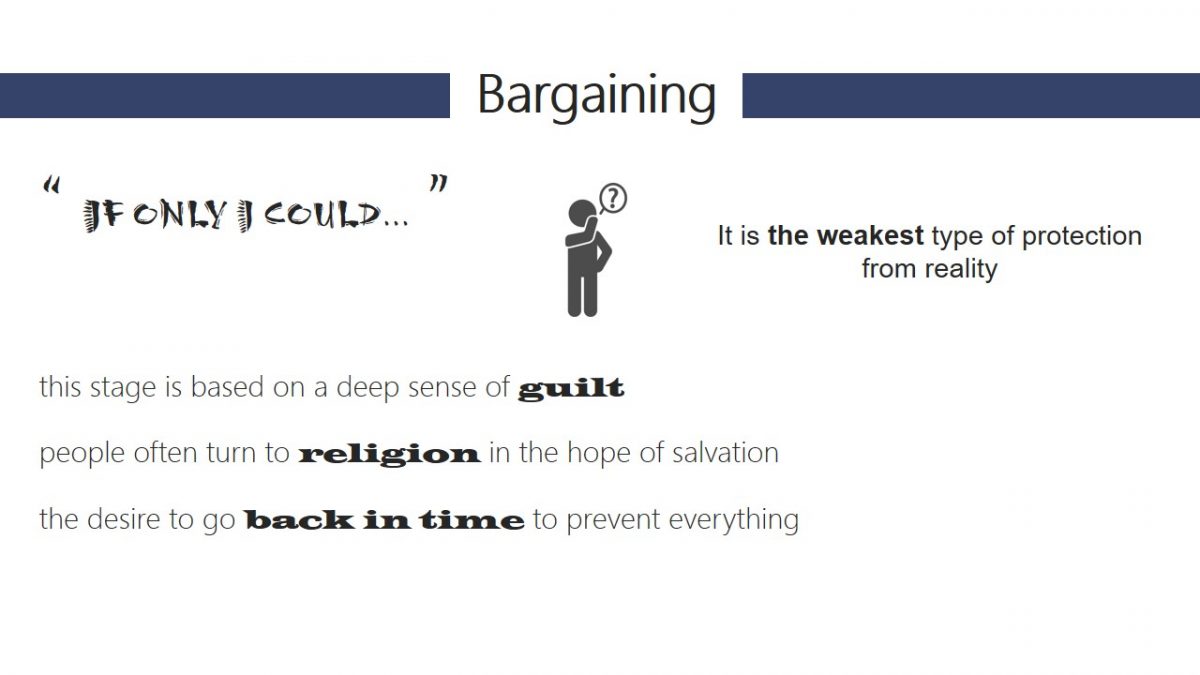
Depression
“why move on?… ”
Often perceived as something unnatural.
But it is not
- when the milder stages of grief are over, a person will feel lonely in an empty world
- this is the longest phase of all
- support is needed because people tend to have suicidal thoughts (Worden 95).
At this stage, a person falls into despair: they lost the meaning of life, and the future is unclear. Therefore, such a person understands what real hopelessness is. A depressive state can turn into clinical depression if people close to them do not help, or they do not understand that they must live through and survive this spiritual pain and grief. Depression is considered to be the longest stage of grief.
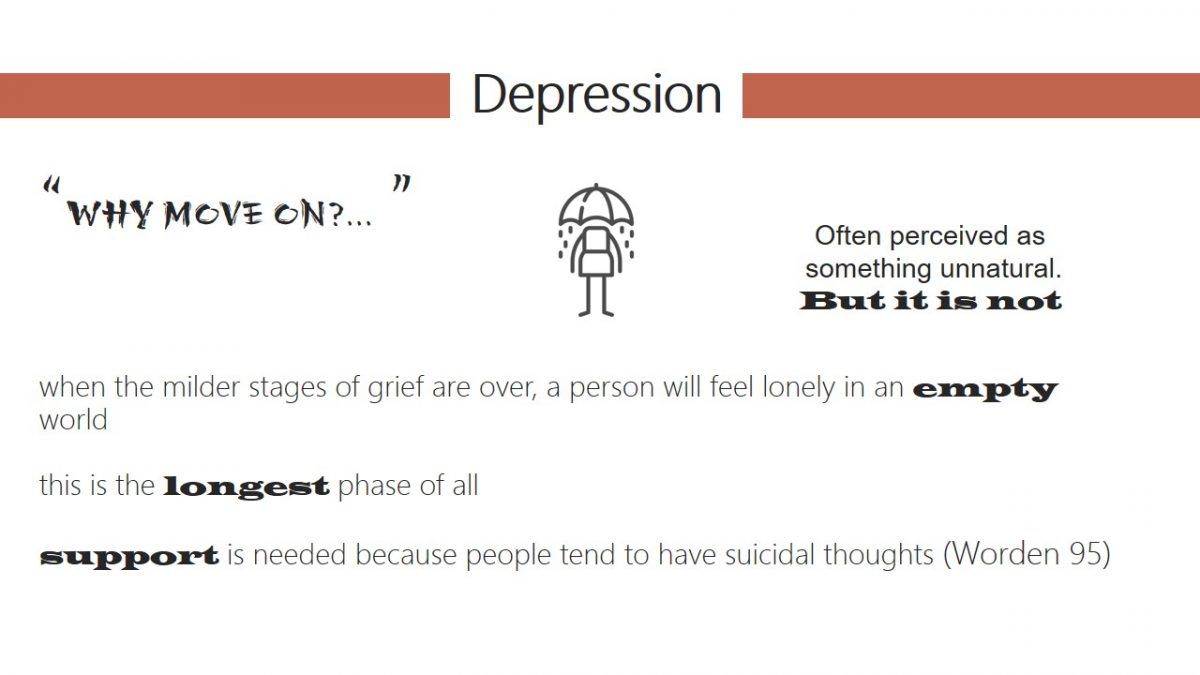
Acceptance
“you have to move on. ”
Is confused with “everything is okay”
But it is never going to be okay.
- not every person can reach this stage,
- a person learns to live with it,
- people cannot be happy; they get the feeling that they betray their loved ones.
Regardless of the severity of the suffering, acceptance is possible – awareness of the inevitability of loss occurs suddenly. The person’s thinking becomes clear; he or she can look back and analyze the course of life and discuss the problem with others. There is still no way to overcome grief completely, but thanks to acceptance, a person may be closer to a healthy state.
The permanent way of life is restored and it begins to gain meaning again. The person becomes receptive to joy, returns to daily activities, and restores social contacts.
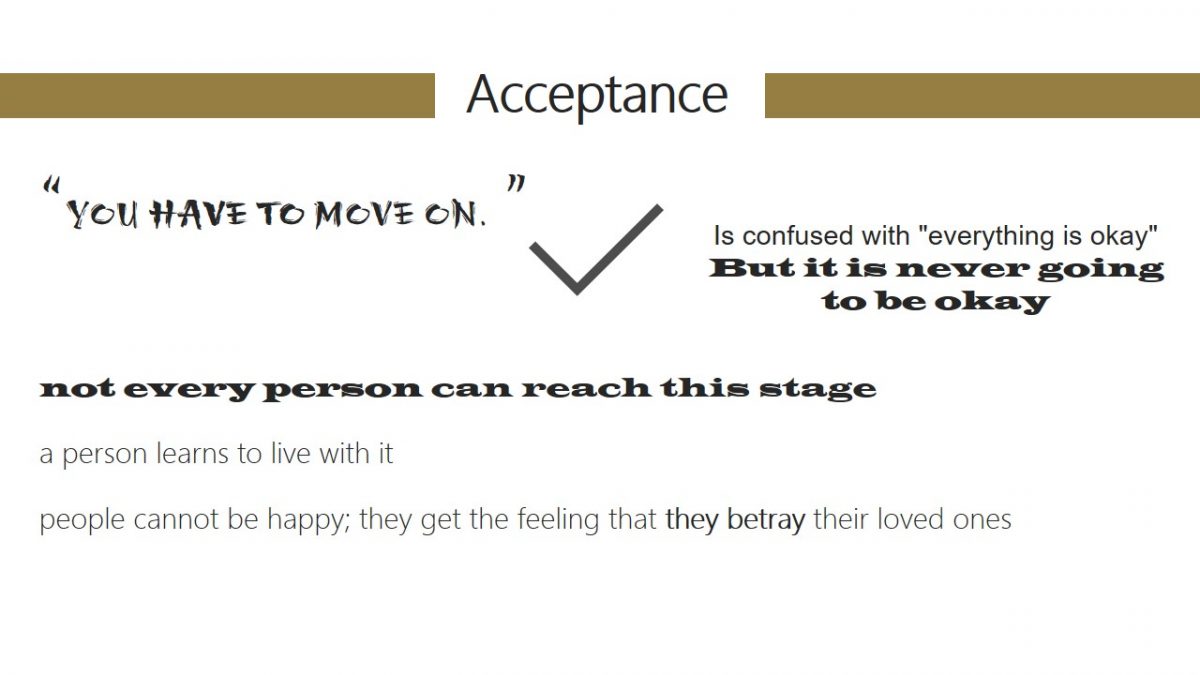
How Can We Help Ourselves?
- Acknowledge the loss;
- attend a funeral, talk in the past tense;
- Look for support;
- see a psychologist or talk to a person with the same problem;
- Learn a new skill;
- try to do something you have never done before;
- Do not dull the pain;
- you should not look for a new relationship to forget the old.
It is possible to try to give practical advice on how to cope with bereavement, but for the process of grief, it is necessary to perform four main tasks. First of all, one must acknowledge the fact. It is necessary to go through funeral rituals. It is recommended to avoid the common phrase “for me he/she will always be alive.” It is better to start talking (and thinking) about the deceased in the past tense. It is not necessary to deny the importance of the loss, rather it is important to find support. Death brings with it not only sadness and depression. There will also be feelings of loneliness, guilt, fear (“How will I live now?”), and even anger (“Why is this happening?”). People are usually ashamed of this anger, but one should keep in mind that it is not a rare manifestation of grief, and it must be worked through. It is advisable to share all feelings with loved ones. One may contact a psychologist, but preferably someone who has suffered a loss. Moreover, it is effective to try to get distracted and learn to do things one has never done before. This way, it is possible to switch attention from one thing to another. It would be wring to drown out the pain of loss. One should not hide behind other relationships since this will make it worse for one’s family and themself. Finding a way to start a new life while having good memories of the deceased is essential. This is the most important and delicate moment in the process of grief. By doing this, one will have the strength to start a new life, in which they will maintain an emotional connection with their loved one, but it will have a different meaning.
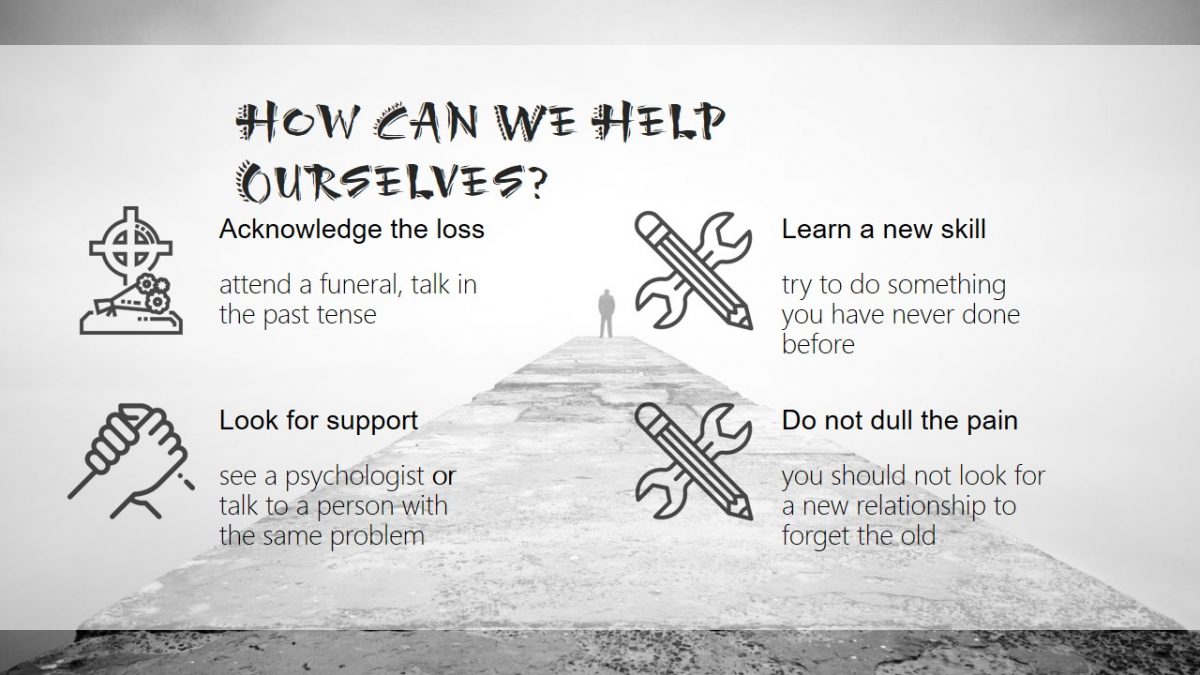
Works Cited
Stroebe, Margaret, et al. “Cautioning Health-care Professionals: Bereaved Persons Are Misguided through the Stages of Grief.” OMEGA-Journal of Death and Dying, vol. 74, no. 4, 2017, pp. 455-473.
Worden, J. William. Grief Counseling and Grief Therapy: A Handbook for the Mental Health Practitioner. Springer Publishing Company, 2018.
x1klima. Woman and Grief, 2016. Web.